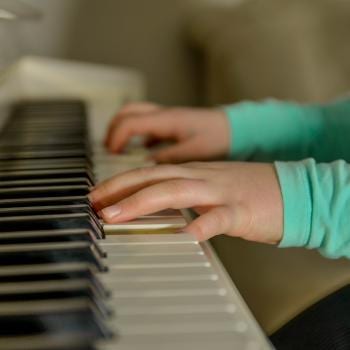 This evening I was sitting with my laptop, working, when I vaguely noticed a commotion behind me. Sally was playing with WEDGiTS, and Bobby was butting in. He wasn’t trying to be mean, he just wanted to play too, but the result was that he kept knocking over Sally’s creations and she grew upset. She tried to elbow him out, to surround the toys with her body, but it didn’t work. Bobby wouldn’t be put off, and he couldn’t play with the WEDGiTS with her without getting in her way. Finally, she ran off, angry and exasperated, and threw herself on her bed.
This evening I was sitting with my laptop, working, when I vaguely noticed a commotion behind me. Sally was playing with WEDGiTS, and Bobby was butting in. He wasn’t trying to be mean, he just wanted to play too, but the result was that he kept knocking over Sally’s creations and she grew upset. She tried to elbow him out, to surround the toys with her body, but it didn’t work. Bobby wouldn’t be put off, and he couldn’t play with the WEDGiTS with her without getting in her way. Finally, she ran off, angry and exasperated, and threw herself on her bed.
All of this I picked up peripherally—I was focused on the work I was doing on my laptop. But suddenly I realized Sally had gone off upset. I pulled my attention away from my laptop, a bit guiltily. I knew what had happened, I just hadn’t given it my full attention or intervened. Bobby was now alone, playing with the WEDGiTS.
And so I went and found Sally. She was laying on her bed, and had pulled the covers up around her. For several years now, Sally has coped with growing angry by “sleeping”—sometimes that means actually taking a nap, and other times it means just laying down, closing her eyes, and resting. This way of dealing—of achieving a reset—has headed off many a tantrum. “Sleeping helps me calm down,” Sally has explained to me many a time.
“Sally, I saw what happened,” I told her. “Come on, let’s go find something else for your brother to play with, she that he doesn’t mess up your tower.”
“How about his farm?” Sally volunteered as she hopped out of bed.
And so we got out Bobby’s farm, with his toy cows and horses and barn, and set it up across the room from the WEDGiTS for him to play. Bobby immediately became engrossed in his farm, and Sally began to build with her WEDGiTS unimpeded. There was still one thing left to do.
“Sally,” I said as I sat down beside her, “you did a good job not hitting your brother when you got angry.”
“Oh, thanks!” Sally replied with a smile.
“I’m sorry I wasn’t paying attention,” I told her. “Next time you can ask me for help, and I’ll distract your brother so that you can build, okay?”
And that was that.
One thing that has been interesting about parenting two children has been watching their relationship grow—but also watching the ways they can try each other’s patience. If Bobby hits Sally, I show him the correct way to touch his sister—gently—and if Sally hits Bobby I have a productive with her about the proper way to interact with her brother (these conversations are generally very productive). But mostly this is unnecessary, because I also teach Sally to respect Bobby’s space and not tickle or poke him when he’s not interested, and protect Sally’s space, ensuring that she can make projects or build creations without having to worry about having the results of her creativity destroyed at any moment.
Sally understands that Bobby is younger than her, and that often when he gets in the way he’s not doing it on purpose. “He doesn’t know any better,” she will say knowingly. I’ve worked to foster empathy and understanding in her, so that she thinks about why others act as they do rather than imputing negative motives onto them. Of course, knowing that Bobby “doesn’t know any better” doesn’t make it less annoying when he gets in her way. “We have to help him to learn to know better,” she has insisted on more than one occasion.
In the end, I’ve found that parenting young children is about achieving a sort of balance—teaching them that they can expect to have their possessions and their space protected, but also that they should be open to sharing as a part of being kind to others. If something belongs to specifically one or the other of them, I never force them to share. I may suggest it, I may encourage it, but I don’t require it. If something is a communal possession, belong either to both of them or to the family as a whole, sharing is required. Sometimes this means having them both play with something together and other times it means having them take turns.
If Sally and Bobby know that I can be trusted to be fair, both regarding how shared possessions are shared and regarding how personal possessions are protected, they are much more likely to share happily and without complaint. For Sally and Bobby, in other words, good sharing goes hand in hand with knowing that they will have fair treatment and that what’s theirs is theirs.
And now I have to go. Sally is pulling on my sleeve and reminding me that I promised to help her build a fort after supper. 🙂














